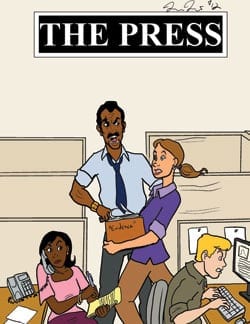
A bankrupt church strategy
The election of Barack Obama as president did not launch the post-racial America as many had hoped. While many racial attitudes have softened, the Republican campaign for a presidential candidate establishes that racial hostility is still very much alive. The campaigns of the conservatives often seem to be primarily efforts to organize the bigots to evict the black family from the White House.
Despite the flagrant racial adversity, some journalists have the temerity to suggest that there is no longer any need for black-owned banks in America. They apparently come to that conclusion because OneUnited Bank has been forced to foreclose an unpaid loan to Charles Street African American Episcopal Church in Boston.
It is difficult to understand the rationale for such a proposition. According to the Reuters News Agency, there has been a substantial increase in bank foreclosures on churches. Reuters reports that 270 churches have been sold after a default since 2010, and 90 percent of the sales have followed a foreclosure.
Banks are apprehensive about lending to churches because of the adverse publicity in the event of a default. Those protesting on behalf of Charles Street Church have pledged to conduct a national campaign to impair the capacity of OneUnited Bank to lend to others. That would be the result if they are successful in persuading great numbers of other customers to withdraw their FDIC insured deposits from the bank.
The Banner editorial of March 15, 2012, entitled “Economic equality at risk,” sets forth the grim data of the economic status of African Americans. At the core of a strategy to improve the condition of blacks is the development of black-owned banks to guide the transition from constant consumer to emerging capitalist. As the nation’s largest black-owned bank, OneUnited Bank has to help lead that process.
This is not just wishful thinking. Asians have already done this. There has been no journalistic criticism of the Chinese bank. East West Bank was established in 1973. It now has 119 branches in California, Georgia, Massachusetts, New York, Texas and Washington — wherever there are substantial Chinese communities. As of Dec. 31, 2011, East West had assets of almost $22 billion, net income of $245.2 million, and is about 40 times larger than OneUnited Bank.
According to the U.S. Census, there are only 17.3 million Asian Americans (6 percent), about half the number of African Americans. The largest group of Asian Americans are Chinese. This group has the highest education levels and the highest median personal and family incomes of any U.S. racial or ethnic group.
The East West Bank has played a significant role in this success. African Americans should mobilize around OneUnited Bank so that it can become big enough to achieve major financial stature and play a similar role. It is unseemly for black ministers to impede black economic progress.
Sharing the road
Many drivers are afflicted with the Detroit syndrome — they are the kings of the road. Anything other than another motor vehicle on the highway is an unwelcome interference.
When Mayor Menino applied the bicycle symbols to the streets, it at first seemed like an imposition. The roadway is for cars! But then a transformation began to occur. Tough drivers began to talk of sharing the road with cyclists.
There was no intention of endangering bicyclists, but it is much more civilized to be aware of gladly accommodating everyone. Spring is upon us and the New Balance bicycle program is about to return to the streets. Just the sight of those bike racks reminds us that life can also be lived at a more harmonious pace.






